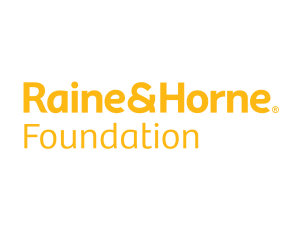Foundation for Rural & Regional Renewal (FRRR)
The Raine & Horne Foundation launched in 2021, formalising 139 years of charitable giving on behalf of the business and network. With a core alignment to the issue of homelessness, the Foundation’s first partnership was with the not-for-profit charity Dignity. As they looked for further avenues to make a difference in Australia, they sought to partner with FRRR and have just announced a $100,000 contribution to our Strengthening Rural Communities program.
FRRR Partnerships Specialist Jillian Kirwan Lee recently spoke with Raine & Horne Executive Chairman, Angus Raine, about the aims of the Foundation and why they chose to partner with FRRR.

Tell us about the Raine & Horne Foundation and its background.
We’re heading into our 140th year next year and we thought it was about time we should formalised our giving. We only launched Raine & Horne Foundation last year and we’ve always been giving back to the community. But we wanted to formalise it, not to mention legalise it. To date, we’ve nearly given $400,000 away to the community.
And that that that’s a contribution not only from each and every one of our offices, but also from us at corporate and it’s had fantastic cut through in 2022.
As a household brand like ours – a brand that has been around 139 years – the public demand a CSR program. It’s not just a tick of the box; they actually demand that you have something that’s formalised and you’re giving back to the community. Now more than ever, it’s very, very important.
Our first partnership was with the homelessness charity Dignity. We have a Raine & Horne Foundation House in Southwest Sydney. I visited only about a month ago. It’s for people suffering from homelessness – to get them back on their feet and then housed in a more formal environment. It’s really quite a substantial building – that’s equivalent to 4,000 nights accommodation per year for people experiencing homelessness.
What was it about rural Australia that was particularly important to Raine & Horne?
I think firstly, a lot of Australians are either physically tied to regional and rural communities, or even more so, emotionally tied.
Also, we’ve got over a third of our offices in regional and rural Australia, the length and breadth of Australia. So, that really resonated with us, not to mention the natural disasters that seem to impact those regional rural areas more than the major capital cities.
Also, I think our values sort of align too, very much so. FRRR seems to be project driven. So, the money just doesn’t disappear into the ether. It’s actually tangible results – and I love that term that you use – hyperlocal. I think that is a great term, something that’s really got in my frontal lobe. It leapt out on your website. So, you go in and you really add value and really rebuild communities.
How does the Raine & Horne Foundation connect with the broader business? And how will the Foundation use these initiatives to connect with your branches outside of the metro areas?
With our homelessness partner, Dignity, our officers have participated in boxing food up for the homeless, also folding clothes. Because a lot of the time, under emergency situations, people are leaving their previous home, and usually under cover of darkness. So, they have nothing. Our teams have helped their clothing charity. It is hard because it’s such a massive country. We’ve got offices in Dubbo, Dalby, Roxby Downs, so it’s hard getting them physically involved. At the outset, it’s more about them contributing at a financial level. But if their offices are near one of our charity partners, then usually our team just put their hands up and love to help.
Also, with Dignity, they’re desperate for socks, so we donated through all our offices – one for one. We got Raine and Horne socks, which I’m wearing at the moment. We’ve got 3,000 people in the National network. We partnered with Swanky Socks and they donated a generic pair of socks to Dignity for every time our offices bought a pair. It was nearly 2,000 socks we gave.
Finally, do you have any advice for other any other corporates and such as yourselves in in designing their corporate social responsibility strategy or partnering with not for profits?
Well, I think now it’s actually much easier to set up your legal structure for a foundation, whereas only ten plus years ago was it was quite tricky. So there goes there every corporate’s last excuse – it’s quite an easy process.
I think it’s your staff also. They really, really love going out and helping. I think that it’s really on everyone’s radar in 2022 to help and give back.

